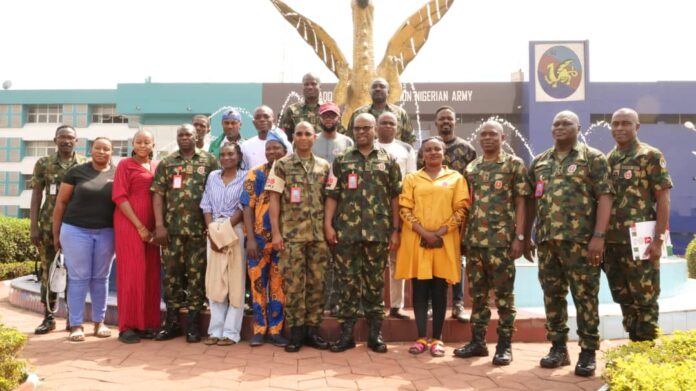By Chimezie Godfrey
The journey to Nigeria’s South-East on a tour sponsored by the Defence Headquarters (DHQ) Abuja was nothing short of an eye-opener. It was a front-row seat to the sacrifices, risks, and progress being made by military personnel in their tireless efforts to ensure peace and stability across the country.
For over a decade, Nigeria has grappled with multifaceted insecurity issues: terrorism by Boko Haram, banditry, farmer-herder clashes, militancy, kidnapping, and a host of other crimes. These challenges have left a significant dent on the country’s socio-economic landscape, with the Nigerian military bearing much of the burden alongside other security agencies.
In recent years, the resurgence of the Biafran self-determination agitation—initially spearheaded by the Indigenous People of Biafra (IPOB)—has morphed into a complex security crisis. The rise of IPOB’s militant wing, the Eastern Security Network (ESN), brought criminal elements into the fray, using the agitation as a cover for heinous crimes.
The group’s activities, particularly enforced sit-at-home orders, have crippled the South-East’s economy. Once a beacon of economic vibrancy, the region was reduced to a hotbed of killings, kidnappings, and anarchic rule, leaving residents and visitors in constant fear.
In response, the Nigerian government activated military operations in all six geopolitical zones to tackle the diverse security challenges. These included counter-terrorism efforts in the North-East, anti-banditry operations in the North-West, and now Operation UDO KA in the South-East.
The first stop was at the Headquarters of Operation UDO KA in Enugu, where the Commander of the Joint Task Force South-East, Major General Taiwo Dada, provided an extensive briefing on the task force’s achievements from the second to the fourth quarter of 2024.
“Operation UDO KA conducted both kinetic and non-kinetic operations to address security threats in the South-East,” Major General Dada began. “Our efforts were targeted at neutralizing IPOB and ESN activities, combating illegal oil bunkering, and reducing kidnappings.”
The operation carried out 83 clearance raids, arresting 48 IPOB informants and neutralizing 27 ESN members. These efforts dismantled over 45 IPOB camps and led to the recovery of significant arms, ammunition, and explosives.
One particularly striking operation in May at Uratta Community, Osisioma LGA, resulted in the recovery of 13,000 rounds of ammunition, pump-action guns, and locally fabricated weapons. Another counteroffensive in June neutralized five IPOB members in Ebonyi State and recovered weapons and a vehicle.
Operation UDO KA made strides in combating illegal oil bunkering—a menace plaguing the region. A total of 78 anti-bunkering operations led to the arrest of over 60 suspects and the recovery of nearly one million liters of stolen crude oil. Additionally, 217 illegal refineries were destroyed, particularly in Abia, Imo, and Anambra States.
On the anti-kidnapping front, the operation rescued 82 hostages between May and November 2024. Notable successes included preventing a mass kidnapping of passengers in Enugu and rescuing victims from criminal hideouts in Nsukka.
Beyond the battlefield, the task force embraced non-kinetic strategies, such as community outreach and humanitarian support. Medical missions delivered healthcare services to communities in Enugu and Ebonyi, while food and educational supplies were distributed to violence-affected areas. Collaborations with the National Orientation Agency (NOA) helped counter IPOB propaganda and curb recruitment efforts.
“Our non-kinetic operations are equally as critical as the kinetic ones,” General Dada emphasized. “These initiatives help us rebuild trust and foster peace within the communities we serve.”
To address concerns of misconduct, the military launched Operation CHECKMATE, which targeted extortion by soldiers at checkpoints. Over five months, 67 soldiers and two civilians were apprehended, with disciplinary actions taken against offenders. This initiative restored public confidence in the military’s operations.
The gains made by Operation UDO KA were evident across the Forward Operating Bases (FOBs) in the South-East. With IPOB and ESN camps destroyed, oil bunkering reduced, and kidnappings curtailed, a sense of normalcy is gradually returning to the region.
“This is just the beginning,” Major General Dada stated. “We must sustain these operations and work closely with security agencies and community leaders to ensure long-term peace in the South-East.”
As the sun set on the visit, the bravery and determination of Nigeria’s military personnel were undeniable. Their relentless efforts to combat insecurity serve as a beacon of hope for a country yearning for peace and stability. For the South-East and beyond, Operation UDO KA is a testament to the power of strategic and resolute action.




